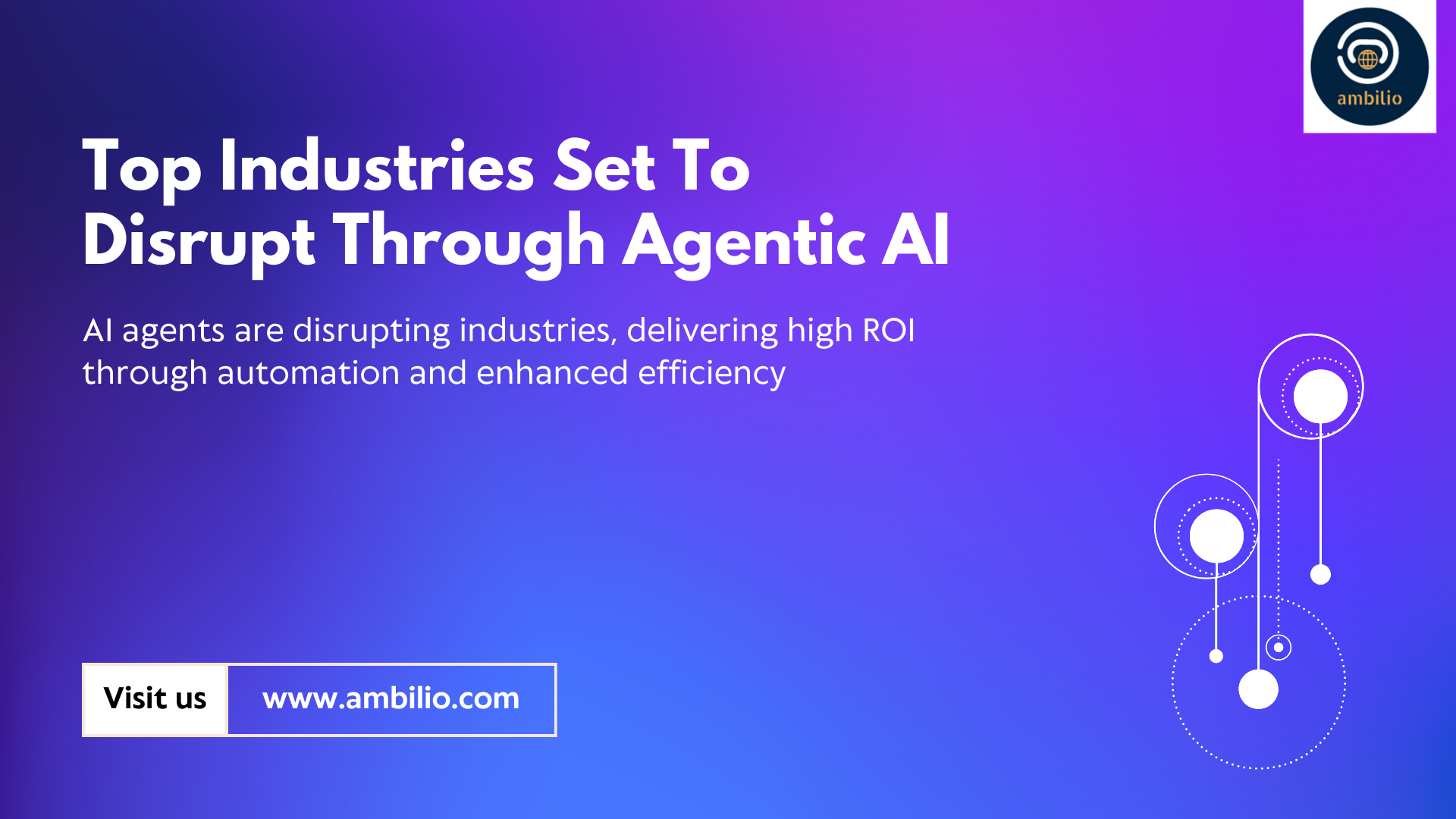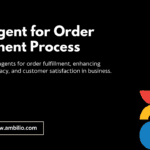In recent years, the rise of Agentic AI, AI agents, and Large Language Model (LLM) agents has marked a significant milestone in the world of artificial intelligence. These technologies are poised to drive transformative changes across several industries, offering businesses the opportunity to enhance efficiency, reduce costs, and provide superior customer experiences. By automating tasks, improving decision-making, and leveraging data insights, AI agents can help organizations stay competitive in an increasingly digital landscape. This article explores the sectors most likely to be transformed by these technologies, focusing on their applications, areas of transformation, and the potential return on investment (ROI).
1. Customer Service and Support: Revolutionizing Interactions
Customer service is one of the most impactful areas where AI agents can bring about dramatic improvements. Traditionally, customer support required a significant number of human agents to handle inquiries, complaints, and requests, leading to high operational costs and the occasional delay in response time. With AI agents, businesses can automate routine tasks, resolve issues faster, and provide 24/7 support to customers.
Applications:
- Chatbots and Virtual Assistants: AI agents can serve as chatbots that interact with customers, answering common questions, guiding them through processes, and resolving minor issues.
- Intelligent Ticketing Systems: LLM agents can help prioritize and categorize support tickets, ensuring that the most urgent issues are escalated promptly.
- Personalized Customer Support: By analyzing past interactions, AI can provide personalized solutions, improving customer satisfaction.
Transformation Areas:
- Cost Reduction: Automating customer service processes helps businesses reduce labor costs by minimizing the need for large customer service teams.
- Enhanced Efficiency: AI agents can handle a large volume of requests simultaneously, improving response times and reducing wait times.
- Improved Customer Experience: Customers benefit from quick, efficient, and personalized interactions, leading to higher satisfaction and loyalty.
ROI Potential:
The ROI in customer service can be substantial. By improving efficiency, reducing the need for human agents, and enhancing the overall customer experience, businesses can achieve long-term savings and increase customer retention.
2. Healthcare: Transforming Patient Care and Operational Efficiency
The healthcare sector is another area where AI agents and LLMs are making a significant impact. From enhancing patient care to streamlining administrative tasks, these technologies are enabling healthcare providers to improve service quality, reduce costs, and enhance operational efficiency.
Applications:
- Clinical Decision Support: AI agents can assist healthcare professionals by analyzing patient data and suggesting possible diagnoses or treatment options, improving decision-making.
- Patient Management: AI can handle appointment scheduling, patient reminders, and follow-up communication, reducing administrative burdens on healthcare staff.
- Medical Research: LLM agents can be used to scan large volumes of research papers, summarizing findings and suggesting relevant studies for doctors and researchers.
Transformation Areas:
- Improved Patient Outcomes: By providing healthcare professionals with real-time data and recommendations, AI can lead to faster and more accurate diagnoses.
- Operational Efficiency: AI can streamline administrative tasks, such as scheduling, billing, and documentation, allowing healthcare providers to focus more on patient care.
- Reduced Costs: Automating routine tasks and optimizing resource management can help reduce healthcare costs, benefiting both providers and patients.
ROI Potential:
The healthcare industry stands to gain a significant ROI by leveraging AI agents and LLMs. Faster diagnosis and treatment, coupled with reduced administrative overhead, can lead to improved patient care and lower operational costs.
3. Finance and Banking: Enhancing Efficiency and Risk Management
The financial services industry is embracing AI agents to manage risk, optimize investments, and provide personalized services to clients. These technologies are particularly effective in areas that require quick decision-making, large-scale data analysis, and risk management.
Applications:
- Fraud Detection: AI agents can monitor transactions in real time, identifying patterns that suggest fraudulent activity and triggering alerts for further investigation.
- Customer Support: LLM agents can assist customers by answering queries related to account balances, transactions, or financial products.
- Personalized Financial Advice: AI can analyze customer data and provide tailored investment recommendations, helping individuals optimize their portfolios.
Transformation Areas:
- Enhanced Security: AI agents can improve fraud detection and risk management by analyzing vast amounts of transaction data to spot potential threats.
- Personalized Services: By understanding a customer’s financial behavior and goals, AI agents can provide customized financial advice and solutions.
- Operational Efficiency: Automating routine processes such as customer service, transaction monitoring, and reporting reduces manual intervention and improves accuracy.
ROI Potential:
The financial sector can expect a significant ROI through improved security, personalized services, and cost-saving automation. AI’s ability to handle complex data and detect fraud in real-time will help financial institutions enhance both profitability and customer satisfaction.
4. Retail and E-Commerce: Optimizing Operations and Enhancing Customer Engagement
Retail and e-commerce businesses are increasingly relying on AI agents to provide personalized shopping experiences, improve inventory management, and optimize supply chains. With the growing reliance on digital shopping, these technologies are helping companies meet customer expectations and stay competitive.
Applications:
- Personalized Recommendations: AI agents can analyze a customer’s browsing and purchasing history to offer personalized product suggestions, increasing sales and customer satisfaction.
- Inventory Management: AI can predict demand, optimize stock levels, and automate replenishment processes, reducing waste and ensuring products are available when customers need them.
- Customer Engagement: LLM agents can engage customers through chatbots, answering questions and helping with product selection.
Transformation Areas:
- Better Customer Experience: Personalization, efficient customer support, and faster order processing lead to a more satisfying shopping experience.
- Operational Efficiency: AI can automate inventory management, demand forecasting, and order fulfillment, reducing operational costs.
- Sales Growth: Personalized recommendations and enhanced customer service increase conversion rates and customer loyalty.
ROI Potential:
Retailers can expect significant ROI through enhanced customer engagement, improved inventory management, and cost savings from automation. The ability to offer personalized services will also lead to higher sales and customer retention.
5. Human Resources and Recruitment: Streamlining Processes and Enhancing Talent Management
Human Resources (HR) is another area where AI agents and LLMs are transforming how businesses manage talent. From recruitment to employee development, these technologies are automating and optimizing various HR functions.
Applications:
- Recruitment Automation: AI agents can screen resumes, conduct initial interviews, and shortlist candidates, speeding up the hiring process.
- Employee Engagement: AI agents can assist in monitoring employee satisfaction, providing personalized feedback, and suggesting training programs based on individual performance.
- Onboarding and Training: LLM agents can help create personalized training materials and provide employees with ongoing learning opportunities.
Transformation Areas:
- Faster Hiring: By automating candidate screening and initial interviews, companies can fill positions faster and reduce the cost per hire.
- Employee Retention: AI agents can provide insights into employee satisfaction, helping HR teams address issues before they lead to turnover.
- Cost Reduction: Automating administrative HR tasks such as scheduling interviews and processing paperwork can reduce overhead costs.
ROI Potential:
By streamlining recruitment processes, improving employee engagement, and reducing turnover, businesses in the HR sector can achieve substantial ROI. Automation in recruitment alone can lead to significant savings in time and resources.
6. Supply Chain and Logistics: Optimizing Operations and Enhancing Efficiency
The supply chain and logistics industry is highly dependent on timely data, coordination between different stakeholders, and the ability to adapt quickly to changing conditions. AI agents, particularly those driven by LLMs, can significantly improve operational efficiency, reduce costs, and enhance decision-making processes in supply chain management.
Applications:
- Demand Forecasting: AI agents can predict customer demand based on historical data, helping companies adjust their supply chain operations accordingly.
- Route Optimization: AI-powered agents can analyze traffic, weather, and other variables to recommend the most efficient delivery routes, minimizing delays and fuel consumption.
- Inventory Management: AI agents can automate inventory tracking, predicting stock levels, and reordering supplies when necessary.
Transformation Areas:
- Efficiency Gains: Automation of logistics tasks, such as scheduling and route planning, reduces human error and enhances operational efficiency.
- Cost Reduction: By optimizing routes and predicting demand accurately, companies can reduce fuel costs and avoid stockouts or overstocking.
- Improved Customer Satisfaction: Real-time updates and more accurate delivery timelines lead to better customer experiences.
ROI Potential:
Supply chain companies can realize substantial ROI through cost-saving efficiencies, better demand forecasting, and enhanced customer service. The automation of routine tasks and optimization of resources leads to lower operational costs and increased profits.
7. Manufacturing: Smart Production and Predictive Maintenance
The manufacturing industry has been a key adopter of AI technologies for process optimization, predictive maintenance, and smart production. AI agents, particularly in manufacturing, can enhance production efficiency, monitor equipment performance, and ensure minimal downtime.
Applications:
- Predictive Maintenance: AI agents can monitor equipment health in real time, predicting potential failures before they occur, allowing for timely maintenance.
- Production Optimization: AI can optimize production schedules, resource allocation, and inventory management, reducing waste and improving throughput.
- Quality Control: AI can detect defects or anomalies in products during the manufacturing process, ensuring high quality and minimizing errors.
Transformation Areas:
- Operational Efficiency: Automating routine monitoring and maintenance tasks improves operational efficiency and reduces unplanned downtime.
- Cost Savings: Predictive maintenance helps avoid costly repairs and reduces machine downtime, directly impacting profitability.
- Increased Production Capacity: AI-powered optimization can lead to smoother production workflows, ultimately increasing production capacity without additional resources.
ROI Potential:
Manufacturers can achieve a high ROI by reducing maintenance costs, increasing production efficiency, and minimizing downtime. AI’s ability to predict issues before they arise ensures that costly repairs and production halts are kept to a minimum.
8. Education: Personalized Learning and Administrative Automation
The education sector is also experiencing a shift due to the integration of AI technologies. With the growing demand for personalized learning experiences and administrative efficiency, AI agents, including LLMs, offer significant benefits to educational institutions.
Applications:
- Personalized Learning: AI agents can provide tailored learning plans, adaptive learning environments, and targeted resources based on student performance and learning styles.
- Automated Grading and Feedback: LLMs can assist in grading assignments, providing immediate feedback to students, and allowing instructors to focus on more complex aspects of teaching.
- Administrative Tasks: AI agents can automate scheduling, enrollment, and communication with students, reducing administrative burdens.
Transformation Areas:
- Improved Learning Outcomes: Personalized learning experiences help students achieve better results, as materials and teaching methods are tailored to individual needs.
- Administrative Efficiency: AI reduces the need for human intervention in repetitive administrative tasks, allowing staff to focus on more impactful activities.
- Enhanced Engagement: With AI-powered learning tools, students can receive instant feedback and guidance, fostering better engagement and learning progress.
ROI Potential:
Educational institutions can realize a high ROI through the reduction of administrative costs, improved student performance, and more efficient allocation of resources. AI tools also enable scalable learning experiences, allowing institutions to serve more students effectively.
9. Legal Services: Streamlining Research and Document Review
The legal industry is known for its data-intensive nature, with lawyers often sifting through large volumes of documents and case law to prepare for litigation. AI agents and LLMs can streamline many of these time-consuming tasks, providing faster and more accurate results.
Applications:
- Document Review: AI agents can scan legal documents to identify relevant clauses, terms, or precedents, reducing the time lawyers spend on manual document review.
- Legal Research: LLMs can quickly process vast amounts of case law, statutes, and regulations to provide lawyers with relevant precedents and legal insights.
- Contract Analysis: AI can automatically analyze contracts, flagging potential issues or clauses that need attention, saving lawyers time in drafting and reviewing agreements.
Transformation Areas:
- Time Efficiency: By automating research and document review, lawyers can spend more time on high-value tasks, such as strategy and client interaction.
- Cost Reduction: AI reduces the number of hours spent on routine legal tasks, directly cutting costs for both law firms and clients.
- Accuracy and Compliance: AI-driven tools can spot inconsistencies or errors in legal documents, improving the quality of legal work and ensuring compliance.
ROI Potential:
Law firms and businesses can see a significant ROI through the reduction of billable hours, faster case preparation, and higher-quality legal work. AI’s ability to streamline time-intensive tasks allows for a more cost-effective legal process.
10. Real Estate: Automating Processes and Enhancing Market Analysis
AI agents are beginning to play a pivotal role in transforming the real estate industry by automating tasks, enhancing customer experiences, and providing better market insights. From property searches to investment analysis, AI is reshaping how businesses and consumers approach real estate.
Applications:
- Property Search Assistance: AI agents can help buyers and renters find properties that meet their preferences by analyzing data on location, price, amenities, and more.
- Market Analysis and Trends: LLMs can provide investors with real-time insights into market conditions, property value trends, and risk factors.
- Automated Property Valuation: AI can analyze historical data and predict future property values, helping investors make informed decisions.
Transformation Areas:
- Efficiency and Convenience: AI-powered tools reduce the time and effort involved in finding properties or completing transactions, improving user experience.
- Improved Investment Decisions: LLM agents can process vast amounts of market data to provide actionable insights, helping investors make smarter decisions.
- Automation of Transactions: AI can automate document generation, contract signing, and other routine tasks involved in real estate transactions, reducing administrative overhead.
ROI Potential:
The real estate industry stands to benefit from increased efficiency, reduced transaction times, and enhanced decision-making. By automating processes and providing market insights, businesses can lower operational costs and make more profitable investments.
11. Energy and Utilities: Optimizing Consumption and Enhancing Sustainability
The energy sector is another area where AI agents and LLMs are driving substantial change. By improving energy management, predictive maintenance, and sustainability efforts, these technologies are enabling businesses to operate more efficiently while reducing their environmental impact.
Applications:
- Energy Demand Forecasting: AI agents can predict energy consumption patterns, helping utilities better manage supply and demand.
- Predictive Maintenance: AI can monitor energy infrastructure such as power plants, wind turbines, and pipelines, predicting when maintenance is required to avoid failures.
- Sustainability Tracking: AI can help organizations track and optimize energy usage, ensuring they meet sustainability goals and reduce carbon footprints.
Transformation Areas:
- Efficiency Gains: By predicting energy demand and optimizing consumption, AI agents can reduce waste and improve overall energy efficiency.
- Cost Reduction: Predictive maintenance reduces downtime and repair costs for energy infrastructure.
- Sustainability: AI helps organizations achieve sustainability goals by optimizing resource usage and reducing emissions.
ROI Potential:
Energy companies can achieve significant ROI through better energy management, reduced operational costs, and improved sustainability efforts. Predictive maintenance also lowers costs associated with unplanned repairs and downtime.
12. Insurance: Automating Claims Processing and Risk Assessment
The insurance industry is ripe for transformation through AI-driven agents. From automating claims processing to enhancing risk assessment, these technologies are streamlining operations and improving customer experiences.
Applications:
- Claims Automation: AI agents can automate the claims process by verifying information, assessing damage, and recommending payouts based on predefined criteria.
- Risk Assessment: AI can analyze customer data to provide more accurate risk assessments, helping insurance companies adjust premiums more effectively.
- Fraud Detection: AI agents can analyze patterns in claims data to detect potential fraud and flag suspicious activity.
Transformation Areas:
- Faster Claims Processing: AI reduces the time it takes to process claims, improving customer satisfaction and lowering operational costs.
- Improved Risk Management: By providing more accurate risk assessments, AI helps insurers adjust pricing and improve underwriting accuracy.
- Fraud Prevention: AI helps reduce fraud by identifying anomalies and patterns that human agents might miss.
ROI Potential:
The insurance industry can achieve significant ROI through the automation of claims, improved risk management, and enhanced fraud detection. AI reduces operational costs, improves underwriting accuracy, and leads to better customer experiences.
Conclusion: The Future is AI-Driven
Agentic AI, AI agents, and LLM agents are transforming industries by automating tasks, improving decision-making, and enhancing customer experiences. From customer service to healthcare, finance, retail, and HR, these technologies offer immense potential for growth and profitability. As businesses continue to embrace AI-driven solutions, the ROI potential becomes increasingly clear, making these technologies essential for future success. With the ability to drive operational efficiency, reduce costs, and offer personalized services, AI is not just a tool for transformation—it is a catalyst for business success in the digital age.



